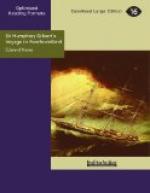The grass and herb doth fat sheep in very short space,
proved by English merchants which have carried sheep
thither for fresh victual and had them raised exceeding
fat in less than three weeks. Peasen which our
countrymen have sown in the time of May, have come
up fair, and been gathered in the beginning of August,
of which our General had a present acceptable for the
rareness, being the first fruits coming up by art and
industry in that desolate and dishabited land.
Lakes or pools of fresh water, both on the tops of
mountains and in the valleys; in which are said to
be muscles not unlike to have pearl, which I had put
in trial, if by mischance falling unto me I had not
been letted from that and other good experiments I
was minded to make. Fowl both of water and land
in great plenty and diversity. All kind of green
fowl; others as big as bustards, yet not the same.
A great white fowl called of some a gaunt. Upon
the land divers sort of hawks, as falcons, and others
by report. Partridges most plentiful, larger
than ours, grey and white of colour, and rough-footed
like doves, which our men after one flight did kill
with cudgels, they were so fat and unable to fly.
Birds, some like blackbirds, linnets, canary birds,
and other very small. Beasts of sundry kinds;
red deer, buffles, or a beast as it seemeth by the
tract and foot very large, in manner of an ox.
Bears, ounces or leopards, some greater and some lesser;
wolves, foxes, which to the northward a little farther
are black, whose fur is esteemed in some countries
of Europe very rich. Otters, beavers, marterns;
and in the opinion of most men that saw it, the General
had brought unto him a sable alive, which he sent
unto his brother, Sir John Gilbert, Knight, of Devonshire,
but it was never delivered, as after I understood.
We could not observe the hundredth part of creatures
in those unhabited lands; but these mentioned may
induce us to glorify the magnificent God, who hath
super-abundantly replenished the earth with creatures
serving for the use of man, though man hath not used
the fifth part of the same, which the more doth aggravate
the fault and foolish sloth in many of our nations,
choosing rather to live indirectly, and very miserably
to live and die within this realm pestered with inhabitants,
then to adventure as becometh men, to obtain an habitation
in those remote lands, in which nature very prodigally
doth minister unto men’s endeavours, and for
art to work upon. For besides these already recounted
and infinite more, the mountains generally make shew
of mineral substance; iron very common, lead, and
somewhere copper. I will not aver of richer metals;
albeit by the circumstances following, more than hope
may be conceived thereof.




